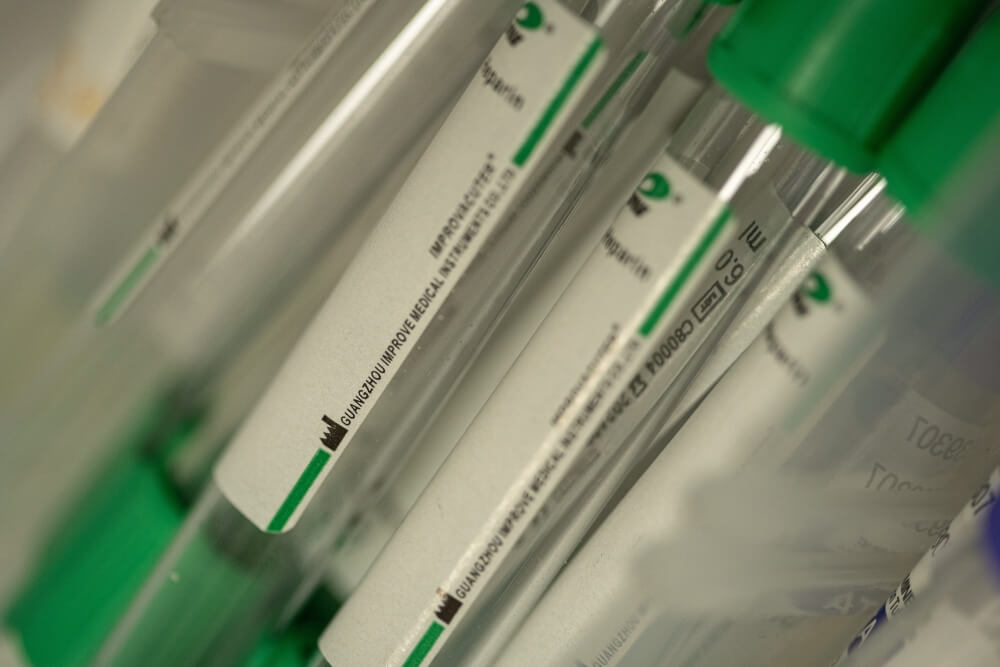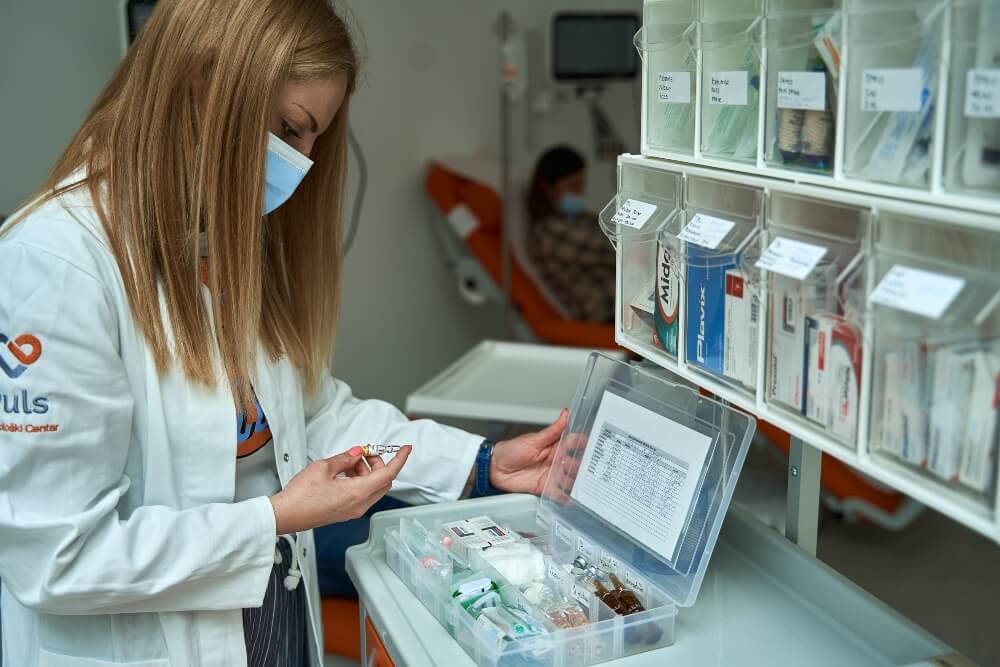The complete blood count is a very important analysis that is used to determine the general condition of the patient and to detect infections, inflammatory processes, anemia, blood coagulation disorders, or some malignant diseases. Although this blood analyse will not always be enough to diagnose illness it is extremely useful as a starting point for further examination of the patient’s condition. Based on the complete blood count the doctor will know where to direct further investigation. It is also useful for monitoring the evolution of the disease and the success of the treatment.
What is included in Complete Blood Count
Complete blood count with differential includes:
- Number of erythrocytes (red blood cells)
- Number of leukocytes as well as differential (absolute number and percentage of 5 main types of leukocytes – neutrophils, lymphocytes, monocytes, eosinophils, and basophils)
- Number of platelets
- Hemoglobin concentration
- Hematocrit level
- Erythrocyte indices, which refers to the average size of erythrocytes (MCV), the average amount of hemoglobin in erythrocytes (MCH), and the average concentration of hemoglobin in erythrocytes (MCHC). Erythrocyte indices are used to determine the cause of anemia.
When should Complete Blood Count be done?
A complete blood count should be done at least once per year, but it’s best if it’s done every 6 months so you could monitor your health, even if you don’t have any health problems. A large number of diseases are hard to diagnose in their earliest phases because many of them don’t have any symptoms at the beginning. That is why it’s important to do regular blood checkups, because some changes in the blood may show changes. For that reason, the complete blood count is an excellent starting point for defining the diagnosis and determining the direction in which the treatment of the patient will go.
Blood work helps with the detection of inflammatory processes, infections, anemia, coagulation disorders, or malignant diseases.
For the patients who are undergoing chemotherapy or radiotherapy, it’s recommended to check their blood more frequently since this type of treatment can affect their blood.
Pregnant women also fall in the category of people that should do this analysis more frequently.
Reference Ranges
When the blood results are done the results should be interpreted only by an expert because only then you will get a clear picture of your health. Increased or decreased values of certain blood parameters can give you information about your health in general, but only detailed and professional analysis of each individual parameter, as well as their ratio to each other, can give you an accurate diagnosis or guidance towards a definitive diagnosis.
The complete blood count analyzes red blood cells, erythrocytes. They are filled with hemoglobin that transports oxygen and carbon dioxide between the lungs and tissues. If the number of erythrocytes is low that, together with levels of hematocrit and hemoglobin, could be an indicator of anemia, while an elevated number can be present in healthy people but also in patients who have certain conditions.
Leukocytes, white blood cells, are created in the bone marrow and their task is to protect the body from infections. When a bacterial infection is present the number of leukocytes will go up. The reduced number is characteristic of viral infections, but it can also be caused by certain medications or chemotherapy.
Platelets are blood cells that form clots to stop or prevent bleeding. Reduced platelets number can indicate, among other things, dotted bleeding, malignant diseases, or autoimmune diseases, while the higher number may indicate increased blood clotting, which can lead to clots.
We underline once again, you should leave the interpretation of the results to the experts. At the Puls Cardiology Center, we have specialists whose priority is the precise and quick diagnosis, followed by the process of treatment and monitoring the effects of treatment.

Very often more analysis needs to be done for additional information. If your doctor suspects that you have some inflammatory process it is likely that he will ask for CRP to be done.
CRP is a protein whose levels will rise in the event of inflammation. Although it can point to the presence of inflammation in your body, it can’t tell us where the inflammation originated.
This analysis is important for many reasons:
- CRP is used to assess how severe the inflammation is
- It can show whether inflammation is caused by a virus or bacteria (in bacterial infection the values will be much higher than in the viral infection)
- CRP shows how a person reacts to the therapy that is prescribed
- After surgery, this analysis helps to see whether there have been any infections
- Among other parameters, it can show if there is some septic process in the body
- In the case of organ transplants, it indicates whether there is a rejection of the transplant
- CRP can help monitor the condition of patients suffering from autoimmune diseases
Normal CRP values are 5mg/L and less, it is slightly elevated when the value is between 10 and 40 mg/L and values between 40 and 200 mg/L, or higher indicate an acute infection.
No preparation is required before taking blood samples for this analysis, but it should be noted if you are on some kind of therapy as some medications may affect the results
Blood Clotting
Increased blood clotting (thrombosis) can occur in both veins and the arteries. The risk of this condition may also be indicated by the results of complete blood count because it measures the level of platelets, which are responsible for blood clotting. If your doctor suspects that you have thrombosis, there is a high probability that he will ask for another blood analysis called D dimer.
D-dimer is a protein fragment that is made when a blood clot dissolves in your blood. This analysis is done when your doctor suspects thrombosis or the existence of a condition that can lead to thrombosis. It is also done in people who are already on some therapy for clotting disorders, in order to monitor the efficiency of therapy.
Causes for thrombosis can be hereditary or acquired. Risk factors for this condition are: age, hypertension, diabetes, insufficient physical activity, obesity, smoking, as well as acquired and congenital deficiencies of natural anticoagulans.
Lately, people with Covid 19 have had blood clotting. Doctors noted that this virus can trigger a clotting mechanism although the exact mechanism is still unclear. As a consequence in some patient, this clotting disorder caused a heart attack or stroke. Therefore blood tests are also a very important indicator of this disease.
How should you prepare for Blood Analysis?

For some analysis, preparation is not necessary, but for some, there are certain rules that should be followed. Be sure to ask your doctor or lab technician if you are not sure how should you prepare. Our experts are always available to you, so don’t hesitate to ask them for advice.
In order for the results to be as credible as possible preparation usually need to start the day before:
- 12-14 hours before analysis you shouldn’t eat, liquids are allowed
- The dinner before analysis should be light
- You shouldn’t drink any alcoholic drinks
- 12 hours before you shouldn’t smoke cigarettes
- You should avoid excessive physical activity the day before
- You should mention to the staff if you have had a heart attack, viral or bacterial infection, or some kind of operation, 8 weeks before.
- You should consult your doctor about taking your medications before the analysis
These analyses are best to be done in the morning, between 7 and 10 am.
By regularly controlling your blood work you will do an important thing for your body, you will be able to detect certain changes in your body even before the symptoms appear. Cardiovascular diseases are among the most common in the world, with a large number of fatal outcomes, and they are among a group of diseases that are difficult to spot at an early stage because it is not uncommon for symptoms to appear only in later stages when treatment conditions are difficult.
The complete blood count is just one of the analyses that you can get done in our clinic. For more detailed information and advice you can call our experts, who are always there to advise you and give you guidance in order to react in time and preserve your health.





